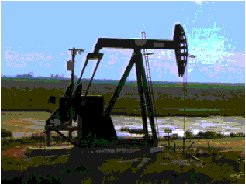Economics for the Earth
A Friends of the Earth Publication
On Issues Linking People, Prosperity and the Planet
June 26, 2000
Dirty Fuels Get Most of the Goodies
Overview
Senate Majority Leader Trent Lott (R-MS) and Energy and Natural Resources Committee Chairman Frank Murkowski (R-AK) are pushing legislation to stabilize the national energy situation. They have offered the National Energy Security Act of 2000 (S.2557) as an amendment to an unrelated funding bill in the Senate. The legislation's purpose is to "decrease America's dependence on foreign oil sources to 50 percent by the year 2010," according to Murkowski. Unfortunately, the proposal is mostly a smorgasbord of energy policies that waste taxpayers money and support dirty energy sources. What follows is a summary of the bill and its impacts on environmental protection and land conservation.
Oil Drilling in the Arctic
Refuge
The most outrageous and controversial proposal in S. 2557 is Title 5, the "Arctic Coastal Plain Domestic Energy Security Act". This provision would open the coastal plain of the Arctic National Wildlife Refuge to oil and gas exploration. This proposal has been hashed and rehashed in the Congress for more than a decade. Bipartisan opposition to opening the wildlife refuge to oil development is strong because it is the largest untouched wildlife refuge in the country. The bill arbitrarily declares Title 5 as the final and absolute decision on drilling in the Arctic Coastal Plain using a 13-year-old environmental impact statement as evidence that the proposal is environmentally sound. Another provision gives responsibility of enforcing safety and environmental regulations to the U.S. Department of Interior rather than with the stricter Environmental Protection Agency. Title 7 of the bill promotes the exploration drilling in sensitive areas by reducing the royalty or leasing costs associated with exploratory wells in the Outer Continental Shelf.

Throwing Tax Dollars Down a Marginal
Hole
Another major environmental concern with S.2557 is the range of new subsidies for marginal oil wells. Marginal oil wells are domestic oil producers that simply do not produce enough oil or gas to remain economically viable. Several provisions in the legislation give support for these poorly producing wells at the taxpayers expense. Title 8, "Tax Measures to Enhance Domestic Oil and Gas Production" provides tax credits for such wells and also allows expensing of oil and gas exploration costs and the delay of rental payments not otherwise chargeable to capital accounts.
In Pursuit of
Pollution
A variety of other provisions in the bill would also have serious environmental impacts. One section proposes that the Department of Energy issue grants for the developing and demonstration of coal liquefaction technology, including the design and construction of a plant capable of producing commercial quantities of liquefied coal. Coal liquefaction is one of the most polluting forms of liquid fuel.
What's the Score?
Usually, proposed legislation with many tax provisions and special programs would be "scored" by the Joint Congressional Committee on Tax to determine how much it would cost the U.S. Treasury. However, the sponsors of S. 2557 have skipped the usual legislative process, so the budget impact has not been determined. Regardless of the exact figures, many of the provisions in S.2557 will waste tax-dollars by delivering most of its benefits to the domestic fossil fuel industry, which already receives billions in tax breaks annually. Under current law, the fossil fuel industry will get more than $7 billion between 2000 to 2004 in tax breaks. Donald Lubick, Assistant Secretary for Tax Policy of the Treasury Department recently testified that "the [tax] code has gone almost as far is it can go and each marginal tax reductionů.is not going help many people." Meanwhile, provisions which focus on effecting energy demand, rather than supply, by attempting to encourage increased energy efficiency, such as the Energy Efficient Affordable Home Act of 1999 (HR. 1358) languish in Congress with no action taken.
Environmental Benefits Few and Far
Between
S.2557 does contain a few provisions to promote more environmentally sustainable energy sources and energy conservation. Title 3, "Provisions to Protect Consumers and Low-Income Families and Encourage Energy Efficiency" expands the federal weatherization program and authorizes an Energy Efficiency Science Initiative within the Department of Energy. Other sections focus on consumer cost/price controls rather than demand reduction. The title includes an education program promoting increased purchase and storage of heating oil when prices are low as well as the establishment of a Northeast Home Heating Oil Reserve. Title 9 focuses on expanding use of renewable energy, improving energy efficiencies and converting to clean burning fuels. A provision is included to expand the tax credit for renewable energy sources to include wind and biomass facilities, and electricity produced from steel cogeneration. Another provision provides a tax incentive for residential use of solar power. However, much of the bill's focus is on consumer cost control, with a provision to allow expensing costs associated with home heating oil storage. This provision might protect against high home heating cost but could also result in increased use of oil.
Prospects
The bill sponsors are pushing the legislation as an amendment to an unrelated bill. The Senate will likely vote on the amendment on June 26 or June 27.
For more information, please contact:
Sean
Moulton: (202) 783-7400 ext. 114,
If you not a regular recipient of Economic for the Earth briefings and would like to be added to the list, please contact Erich Pica, (202) 783-7400 ext. 229.









